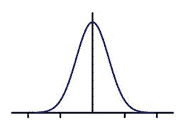As a teacher, I often encouraged my students to check their work before turning in a test or quiz. I thought this simple reminder was helpful, but inevitably, my students would return to their seats, give their paper a once over, and return it to me without making any changes. It wasn’t that these kids lacked motivation; they just had a tremendously difficult time with attention to detail.
Why does asking kids to check over every problem hardly ever help? Let me explain.
Attention to Detail and Homework is Like a Bell Curve
When students get started on assignments, for example a math worksheet, they begin by writing their name on the paper, and completing the first problem or two. This is a way to slowly inch their way up the bell curve slope. As they continue, they are persevering and their attention is strong. As they do a few more problems, they are steadied and focused, but towards the end of the worksheet, as they complete the work and slide down the other slide of the slope, their focus wanes. They’re thinking of the next thing they’re going to do. In a nutshell, they are moving on!
But when we as parents and educators catch them at the end and say, “Don’t forget to check your work!” this is when the problem occurs.
This almost never works for one main reason: after completing a worksheet, the child’s attention is at its lowest point.
He or she is no longer focused on the task at hand, so “checking work” requires the child to slowly inch back up the slope to the top of the curve (aka. the height of attention). This feels incredibly taxing to the student, so he resists. At home, this resistance can result in a power struggle, and in the classroom, it results in the child hastily looking over his paper and turning it in anyway without many changes.
So, what are the solutions to the “checking work” dilemma?
Realize that attention to detail may never be a strength for certain kids, no matter how hard they try or how much parents and teachers poke and prod them. If the student has poor executive functioning skills or ADHD, realize that attention to detail is part of the disability.
Remove the words “check your work,” “slow down,” and “pay attention” from your vocabulary when you’re trying to help your child get through homework. These phrases do not motivate kids.
Instead, encourage your child to highlight or circle the problems that are hard for him as he completes his homework. When he’s done, ask him to only check or redo the problems he circled. Most students can muster enough focus to review the steps of just a few problems.
Younger students love competitive games, even when they’re only competing with themselves. This idea came from one of our tutors, and it really works. Have your child draw a small box on the upper right hand side of his worksheet. After he’s completed the assignment, have him write a tally mark for each problem he circles back and reviews. Allow him to set a goal for the number of problems he wants to check. Five is a good amount. Checking over even five problems is better than none at all!
[sc:HS-misinformation-is-everywhere]
